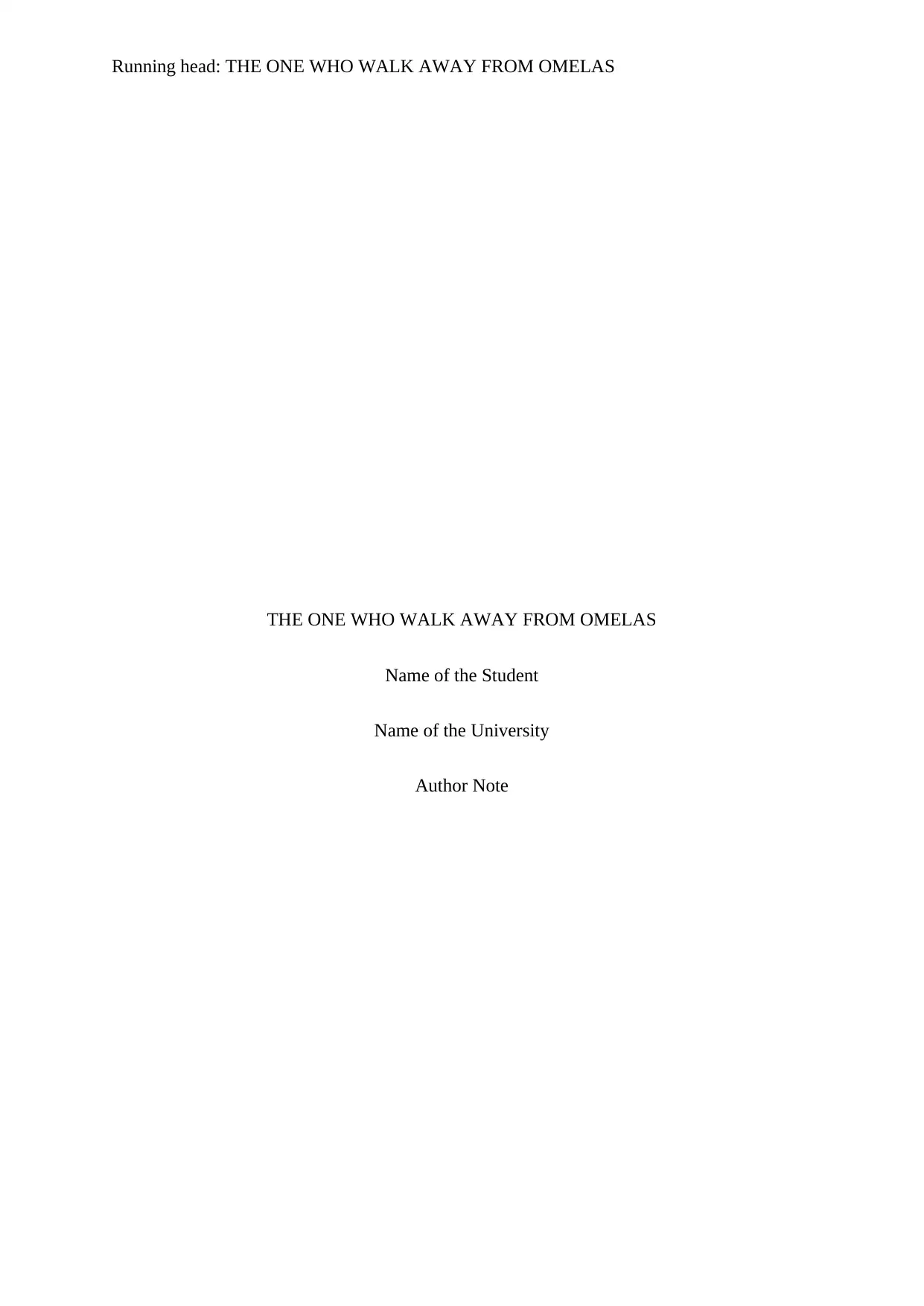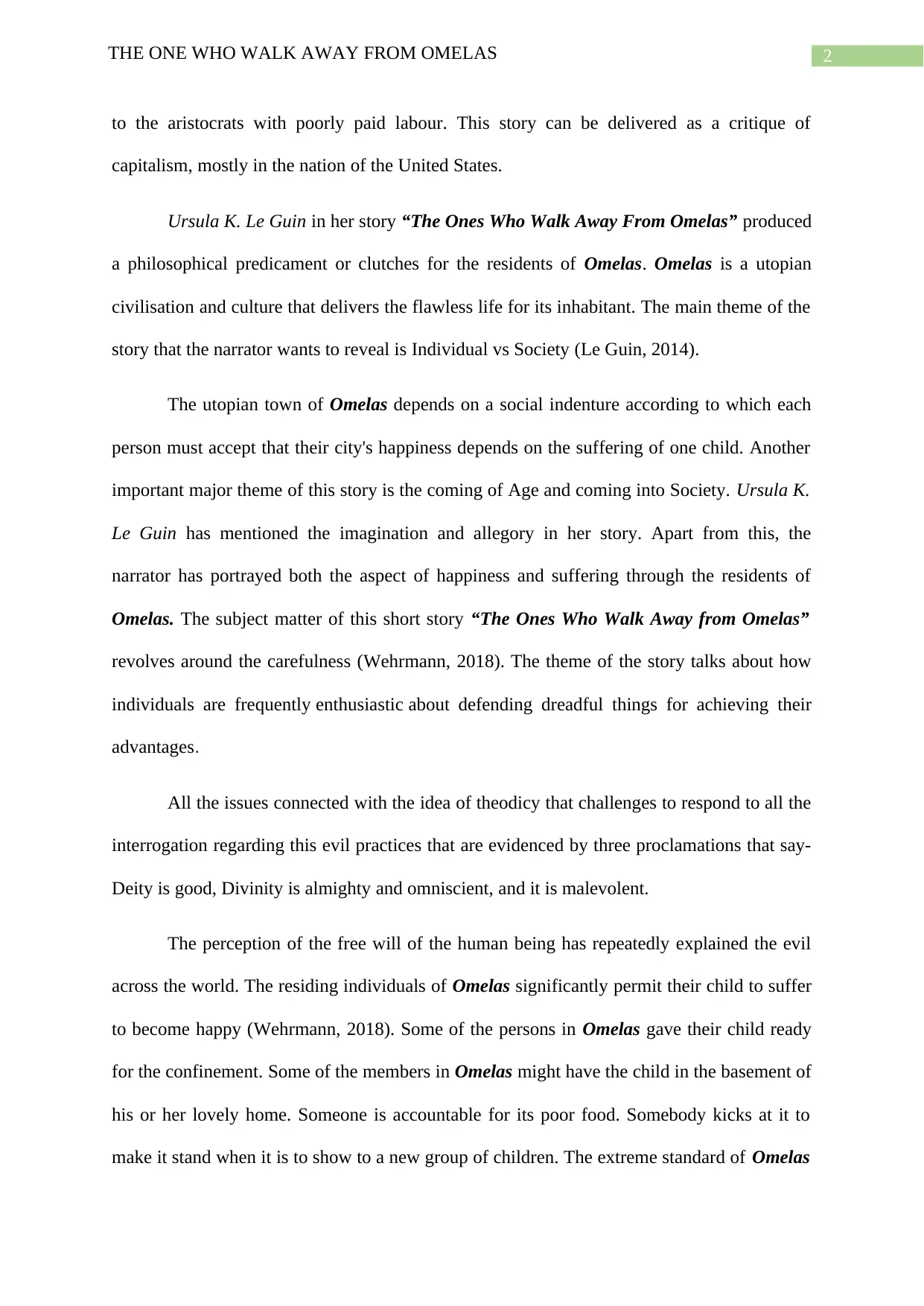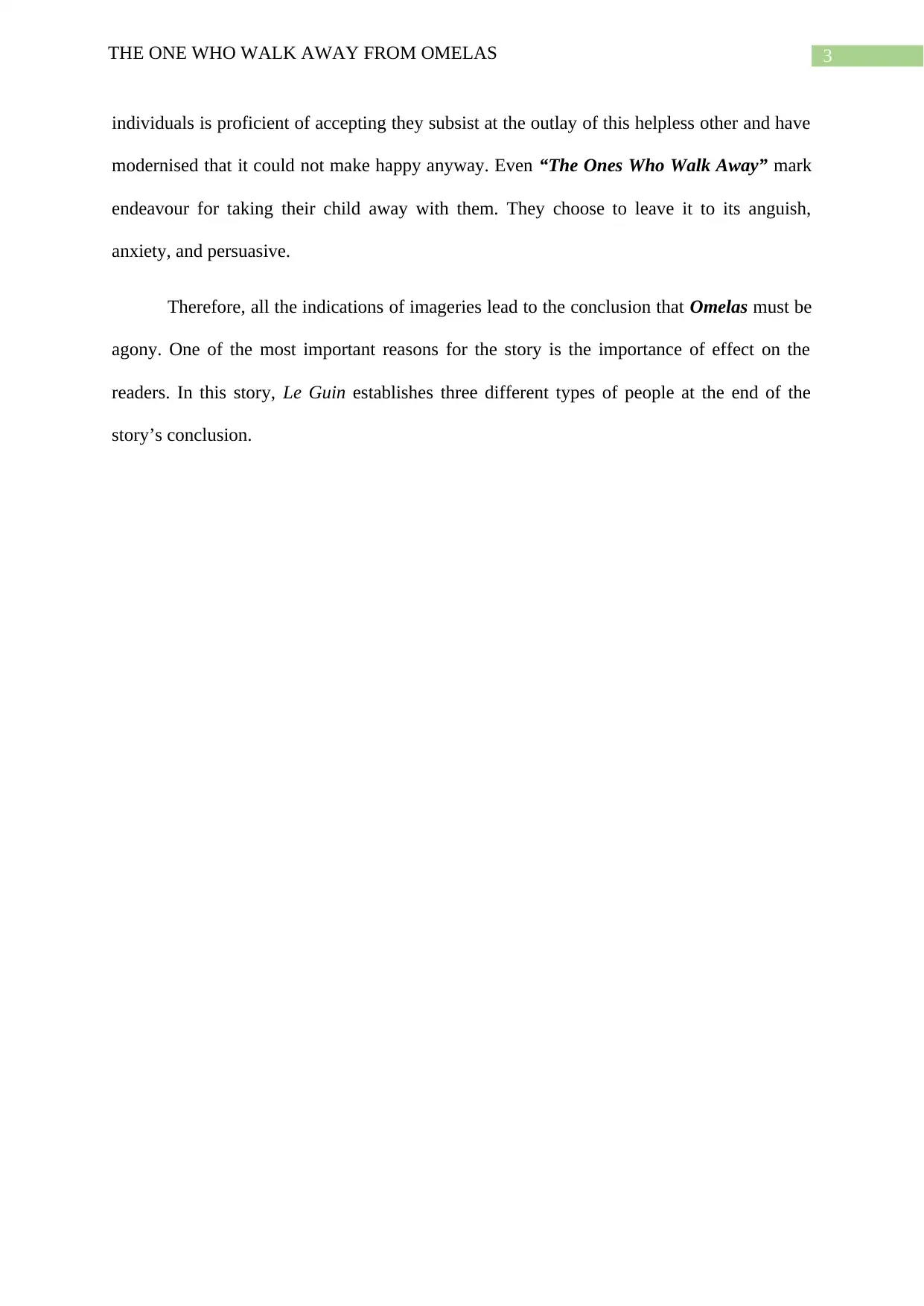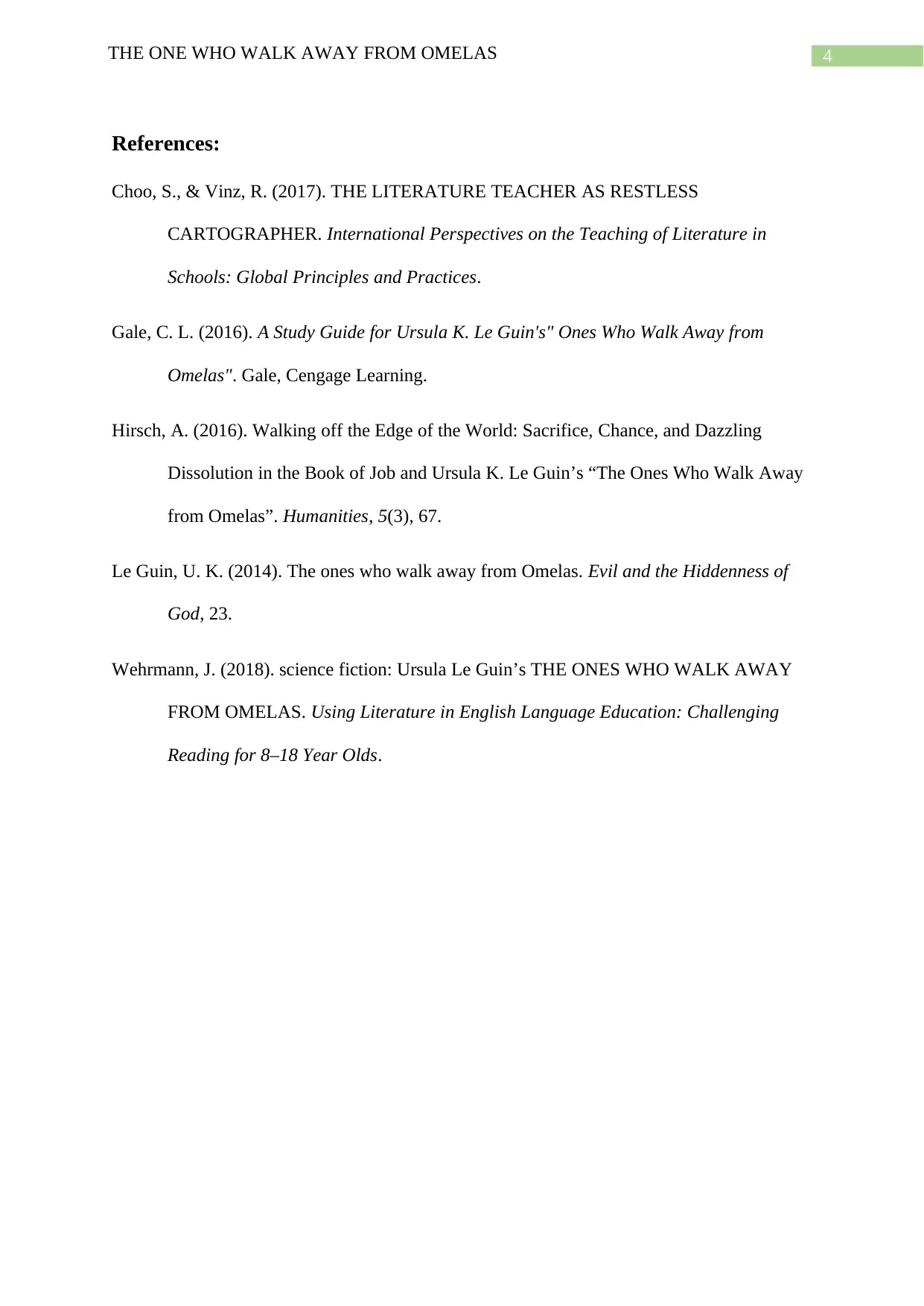The Ones Who Walk Away from Omelas: A Literary Analysis
VerifiedAdded on 2023/01/20
|5
|1077
|21
Essay
AI Summary
This essay provides a comprehensive analysis of Ursula K. Le Guin's short story, 'The Ones Who Walk Away from Omelas.' It examines the story's central moral dilemma, the individual versus society conflict, and the themes of happiness, suffering, and social responsibility. The essay explores how Le Guin uses the utopian city of Omelas to critique societal values and raise questions about the price of collective well-being. It also delves into the philosophical implications of the story, considering the concepts of free will, theodicy, and the choices individuals make in the face of injustice. The analysis highlights the significance of the story's characters, imagery, and allegorical elements in conveying its complex message about human nature and the pursuit of an ideal society. References to relevant literary criticism and scholarly works are also included to support the arguments presented in the essay.

Running head: THE ONE WHO WALK AWAY FROM OMELAS
THE ONE WHO WALK AWAY FROM OMELAS
Name of the Student
Name of the University
Author Note
THE ONE WHO WALK AWAY FROM OMELAS
Name of the Student
Name of the University
Author Note
Paraphrase This Document
Need a fresh take? Get an instant paraphrase of this document with our AI Paraphraser

1THE ONE WHO WALK AWAY FROM OMELAS
Ursula K. Le Guin's "The Ones Who Walk Away from Omelas" is a standard model
of a short story with nonfiction genre. Its foundation centred on a moral dilemma
impersonated by the eminent philosopher William James, who imagined how repulsive
happiness would found on the grief of a juvenile (Choo & Vinz, 2017). The title of the story
proposes the edges with individuals who walk away from Omelas. One of the essential
themes of "The Ones Who Walk Away from Omelas" is that of the individual vs society. In
Omelas, the contentment of the society all together is esteemed above that of the child
incarcerated beneath the city.
Omelas is a utopian civilisation which is situated at the adjoining beautiful place near
glittering sea. The story starts with the people of Omelas, who are rejoicing and enjoying the
Festival of the Summer along with the annual events which are including games and horse
riding (Hirsch, 2016). Beneath the happiness and rejoices of the people into their eye-
catching city, a child, has been incarcerated in a cage and enforced to alive in its own
dirt/smut (Gale, 2016).
Corresponding with many other dystopian societies, Omelas still rely on the fact to be
a utopia. Its tranquil situation by a glittering sea and its enthusiastic Summer Festival, with
the indispensable games as well as horse riding. All designate that Omelas solemnly
contemplates of this one as a perfect society as Le Guin advises, though, the presence of the
ill-treated child beneath the city blemishes that cheerfulness, creating the residents of Omelas
self-centred as well as delusional.
The short story “The One Who Walks Away from Omelas” by Le Guin can be
inferred as a dogmatic as well as a political allegory. The child existing with melancholy or
unhappiness beneath the city signifies the underneath or lower-class, which give the supports
Ursula K. Le Guin's "The Ones Who Walk Away from Omelas" is a standard model
of a short story with nonfiction genre. Its foundation centred on a moral dilemma
impersonated by the eminent philosopher William James, who imagined how repulsive
happiness would found on the grief of a juvenile (Choo & Vinz, 2017). The title of the story
proposes the edges with individuals who walk away from Omelas. One of the essential
themes of "The Ones Who Walk Away from Omelas" is that of the individual vs society. In
Omelas, the contentment of the society all together is esteemed above that of the child
incarcerated beneath the city.
Omelas is a utopian civilisation which is situated at the adjoining beautiful place near
glittering sea. The story starts with the people of Omelas, who are rejoicing and enjoying the
Festival of the Summer along with the annual events which are including games and horse
riding (Hirsch, 2016). Beneath the happiness and rejoices of the people into their eye-
catching city, a child, has been incarcerated in a cage and enforced to alive in its own
dirt/smut (Gale, 2016).
Corresponding with many other dystopian societies, Omelas still rely on the fact to be
a utopia. Its tranquil situation by a glittering sea and its enthusiastic Summer Festival, with
the indispensable games as well as horse riding. All designate that Omelas solemnly
contemplates of this one as a perfect society as Le Guin advises, though, the presence of the
ill-treated child beneath the city blemishes that cheerfulness, creating the residents of Omelas
self-centred as well as delusional.
The short story “The One Who Walks Away from Omelas” by Le Guin can be
inferred as a dogmatic as well as a political allegory. The child existing with melancholy or
unhappiness beneath the city signifies the underneath or lower-class, which give the supports

2THE ONE WHO WALK AWAY FROM OMELAS
to the aristocrats with poorly paid labour. This story can be delivered as a critique of
capitalism, mostly in the nation of the United States.
Ursula K. Le Guin in her story “The Ones Who Walk Away From Omelas” produced
a philosophical predicament or clutches for the residents of Omelas. Omelas is a utopian
civilisation and culture that delivers the flawless life for its inhabitant. The main theme of the
story that the narrator wants to reveal is Individual vs Society (Le Guin, 2014).
The utopian town of Omelas depends on a social indenture according to which each
person must accept that their city's happiness depends on the suffering of one child. Another
important major theme of this story is the coming of Age and coming into Society. Ursula K.
Le Guin has mentioned the imagination and allegory in her story. Apart from this, the
narrator has portrayed both the aspect of happiness and suffering through the residents of
Omelas. The subject matter of this short story “The Ones Who Walk Away from Omelas”
revolves around the carefulness (Wehrmann, 2018). The theme of the story talks about how
individuals are frequently enthusiastic about defending dreadful things for achieving their
advantages.
All the issues connected with the idea of theodicy that challenges to respond to all the
interrogation regarding this evil practices that are evidenced by three proclamations that say-
Deity is good, Divinity is almighty and omniscient, and it is malevolent.
The perception of the free will of the human being has repeatedly explained the evil
across the world. The residing individuals of Omelas significantly permit their child to suffer
to become happy (Wehrmann, 2018). Some of the persons in Omelas gave their child ready
for the confinement. Some of the members in Omelas might have the child in the basement of
his or her lovely home. Someone is accountable for its poor food. Somebody kicks at it to
make it stand when it is to show to a new group of children. The extreme standard of Omelas
to the aristocrats with poorly paid labour. This story can be delivered as a critique of
capitalism, mostly in the nation of the United States.
Ursula K. Le Guin in her story “The Ones Who Walk Away From Omelas” produced
a philosophical predicament or clutches for the residents of Omelas. Omelas is a utopian
civilisation and culture that delivers the flawless life for its inhabitant. The main theme of the
story that the narrator wants to reveal is Individual vs Society (Le Guin, 2014).
The utopian town of Omelas depends on a social indenture according to which each
person must accept that their city's happiness depends on the suffering of one child. Another
important major theme of this story is the coming of Age and coming into Society. Ursula K.
Le Guin has mentioned the imagination and allegory in her story. Apart from this, the
narrator has portrayed both the aspect of happiness and suffering through the residents of
Omelas. The subject matter of this short story “The Ones Who Walk Away from Omelas”
revolves around the carefulness (Wehrmann, 2018). The theme of the story talks about how
individuals are frequently enthusiastic about defending dreadful things for achieving their
advantages.
All the issues connected with the idea of theodicy that challenges to respond to all the
interrogation regarding this evil practices that are evidenced by three proclamations that say-
Deity is good, Divinity is almighty and omniscient, and it is malevolent.
The perception of the free will of the human being has repeatedly explained the evil
across the world. The residing individuals of Omelas significantly permit their child to suffer
to become happy (Wehrmann, 2018). Some of the persons in Omelas gave their child ready
for the confinement. Some of the members in Omelas might have the child in the basement of
his or her lovely home. Someone is accountable for its poor food. Somebody kicks at it to
make it stand when it is to show to a new group of children. The extreme standard of Omelas
⊘ This is a preview!⊘
Do you want full access?
Subscribe today to unlock all pages.

Trusted by 1+ million students worldwide

3THE ONE WHO WALK AWAY FROM OMELAS
individuals is proficient of accepting they subsist at the outlay of this helpless other and have
modernised that it could not make happy anyway. Even “The Ones Who Walk Away” mark
endeavour for taking their child away with them. They choose to leave it to its anguish,
anxiety, and persuasive.
Therefore, all the indications of imageries lead to the conclusion that Omelas must be
agony. One of the most important reasons for the story is the importance of effect on the
readers. In this story, Le Guin establishes three different types of people at the end of the
story’s conclusion.
individuals is proficient of accepting they subsist at the outlay of this helpless other and have
modernised that it could not make happy anyway. Even “The Ones Who Walk Away” mark
endeavour for taking their child away with them. They choose to leave it to its anguish,
anxiety, and persuasive.
Therefore, all the indications of imageries lead to the conclusion that Omelas must be
agony. One of the most important reasons for the story is the importance of effect on the
readers. In this story, Le Guin establishes three different types of people at the end of the
story’s conclusion.
Paraphrase This Document
Need a fresh take? Get an instant paraphrase of this document with our AI Paraphraser

4THE ONE WHO WALK AWAY FROM OMELAS
References:
Choo, S., & Vinz, R. (2017). THE LITERATURE TEACHER AS RESTLESS
CARTOGRAPHER. International Perspectives on the Teaching of Literature in
Schools: Global Principles and Practices.
Gale, C. L. (2016). A Study Guide for Ursula K. Le Guin's" Ones Who Walk Away from
Omelas". Gale, Cengage Learning.
Hirsch, A. (2016). Walking off the Edge of the World: Sacrifice, Chance, and Dazzling
Dissolution in the Book of Job and Ursula K. Le Guin’s “The Ones Who Walk Away
from Omelas”. Humanities, 5(3), 67.
Le Guin, U. K. (2014). The ones who walk away from Omelas. Evil and the Hiddenness of
God, 23.
Wehrmann, J. (2018). science fiction: Ursula Le Guin’s THE ONES WHO WALK AWAY
FROM OMELAS. Using Literature in English Language Education: Challenging
Reading for 8–18 Year Olds.
References:
Choo, S., & Vinz, R. (2017). THE LITERATURE TEACHER AS RESTLESS
CARTOGRAPHER. International Perspectives on the Teaching of Literature in
Schools: Global Principles and Practices.
Gale, C. L. (2016). A Study Guide for Ursula K. Le Guin's" Ones Who Walk Away from
Omelas". Gale, Cengage Learning.
Hirsch, A. (2016). Walking off the Edge of the World: Sacrifice, Chance, and Dazzling
Dissolution in the Book of Job and Ursula K. Le Guin’s “The Ones Who Walk Away
from Omelas”. Humanities, 5(3), 67.
Le Guin, U. K. (2014). The ones who walk away from Omelas. Evil and the Hiddenness of
God, 23.
Wehrmann, J. (2018). science fiction: Ursula Le Guin’s THE ONES WHO WALK AWAY
FROM OMELAS. Using Literature in English Language Education: Challenging
Reading for 8–18 Year Olds.
1 out of 5
Related Documents
Your All-in-One AI-Powered Toolkit for Academic Success.
+13062052269
info@desklib.com
Available 24*7 on WhatsApp / Email
![[object Object]](/_next/static/media/star-bottom.7253800d.svg)
Unlock your academic potential
Copyright © 2020–2026 A2Z Services. All Rights Reserved. Developed and managed by ZUCOL.





